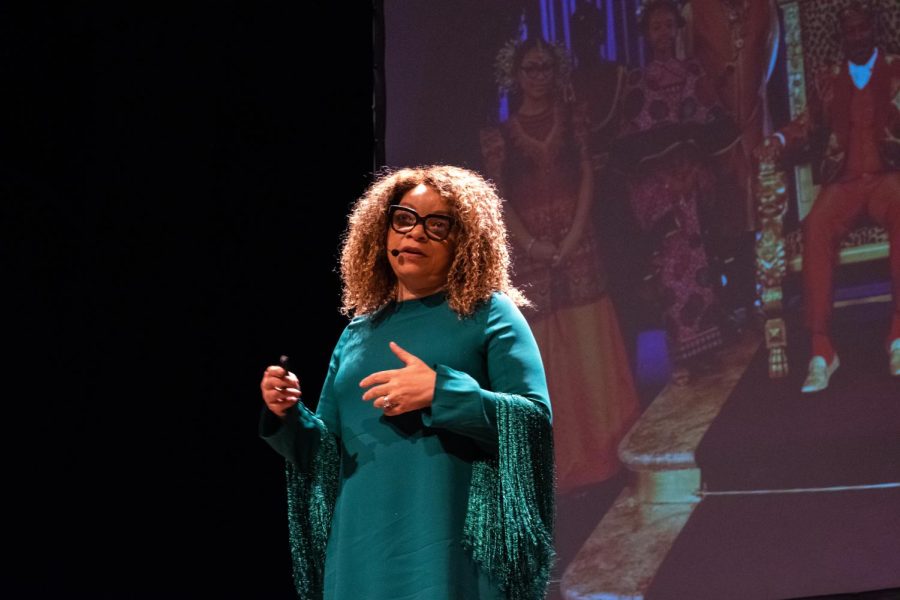The Amherst community gathered on Feb. 17 at Bowker Auditorium for the annual Black Heritage Month Celebration keynote presentation, hosted by the University of Massachusetts Commonwealth Honors College (CHC). The keynote speaker was Ruth E. Carter, an Oscar-winning costume designer who has been working in the industry for three decades.
The event began with opening remarks by Mari Castañeda, dean of the Commonwealth Honors College, and Dr. Ann Marie Russell, CHC’s associate dean of student recruitment, inclusion and success. Dr. Russell acknowledged Carter’s influence in changing public perception through the mediums of design and film in which the audience is challenged to rethink, reimagine and celebrate, “Black culture would be revered as iconic.”
Springfield native Carter centered her talk on Afrofuture and how that concept manifests in costume design, most notably the film Black Panther, for which Carter was the first African-American woman to win the costume design Oscar in 2019.
Carter began her career in theater and emphasized that fashion was not what drew her into costume design. Inspired by the art of Black writers and creators, such as Lorraine Hansberry and Langston Hughes, she saw costume design as a way in which “the rich stories about Black culture could be reimagined.”
Carter spoke of her experiences working on films such as “Selma,” “Coming to America 2,” and “B.A.P.S.,” among many others. For Sam Cadwell, a freshman psychology major at UMass, Carter’s work on Black Panther was familiar, but he did not know “…she had this whole discography of her work. When I found out she did B.A.P.S., I was like, ‘I love that movie,’” Caldwell said, “I didn’t know she was the costume designer for that.”
Carter emphasized that she has always “approached film work like a thespian.” She spoke of collaborating with Spike Lee, with whom she has had a long and creatively productive relationship over the years. Carter recounted her first conversation with Spike Lee — she answered the phone and he said, “This is the man of your dreams. I want you to do my next film, School Daze.” They have since worked on fourteen films together.
Carter told the audience of her process for “Do the Right Thing,” in which she had to learn to meld Nike merchandise and African textiles. Carter’s work is intentional and deeply researched. She spoke of the time she spent researching Malcolm X’s life and reading his work to understand his character. During that time, to better understand his experiences, she wrote to the Board of Corrections and gained access to his files and assorted writings completed while he was in prison.
“I loved every bit of it, especially the walk through of her career. I knew that she worked with Spike Lee, obviously I knew about ‘Black Panther,’ but seeing the specific films, like School Daze for example, was a walk down memory lane for me,” said Dr. Priscilla Maria Page, an assistant professor in the department of theater and a director of the University’s multicultural theater certificate.
“I knew she worked on [the film] ‘Malcolm X,’ but seeing the sketches and the ideas and her attention to detail, to go and study Malcolm X’s life by sitting and reading the letters. I’m a dramaturgy professor so details like history and research are really important to me, and exciting to me,” she added.
Much of Carter’s work has focused on envisioning what Afrofuture looks like — a driving force within the “Black Panther” film. Carter noted that Afrofuture extends from simply visual aesthetics to include how Black creators live out their own Afrofuture, such as Spike Lee and Ava DuVernay.
Carter took the audience on an immersive journey through the creative process of “Black Panther,” centered in the costume design but including the intensive research process of African culture and technology used for all aspects of the film. Queen Ramonda’s headpiece came together from multiple preliminary sketches inspired by the headpiece of South African married women and evolved from there via 3D printers that produced her shoulder mantle and hat.
During the question-and-answer portion of the event, Carter was asked about her inspirations, what it felt like to win her Oscar award, and how theater has informed her film work. When asked how she stays true to herself and her identity coming into the industry, Carter underscored the importance of good mentors and working with independent Black filmmakers that are authentic to themselves.
Carter reflected on the aesthetic differences between creating flashy theater outfits that are meant to be seen far away versus the intimacy of film’s close-up nature, and how it is a constant learning curve.
Madison Brady, an usher at the event, appreciated how Carter explained the costume of the warrior women in “Black Panther.”
“Especially when she was talking about the sexualization of a lot of ‘Marvel’ characters…The fact that she definitely took women empowerment into consideration with the costume design, as well as working with the cultural aspects and the different textures and patterns and designs…” Brady said.
“That really got to me the most because it made me appreciate how much she acknowledges the human aspect of the characters and how they fit into that imaginary world.”
Grace Fiori can be reached at [email protected] and followed on Twitter @grace_fiori.




















